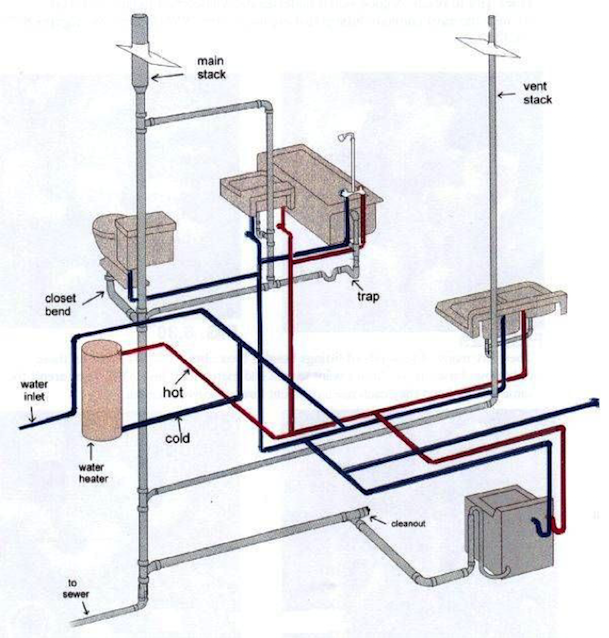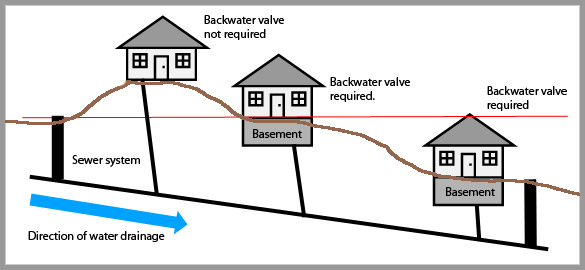Anatomy of Your House's Plumbing System: Why It Matters
Anatomy of Your House's Plumbing System: Why It Matters
Blog Article
Everyone has their unique rationale on the subject of The Inner Workings of Your Home's Plumbing.

Recognizing how your home's pipes system works is vital for every house owner. From providing tidy water for drinking, cooking, and showering to safely eliminating wastewater, a properly maintained plumbing system is vital for your family's health and wellness and convenience. In this comprehensive guide, we'll check out the detailed network that composes your home's plumbing and deal pointers on maintenance, upgrades, and dealing with typical concerns.
Intro
Your home's plumbing system is more than simply a network of pipelines; it's a complicated system that ensures you have access to clean water and effective wastewater removal. Understanding its elements and how they work together can help you avoid costly repair work and guarantee every little thing runs efficiently.
Standard Elements of a Pipes System
Pipes and Tubing
At the heart of your plumbing system are the pipes and tubes that lug water throughout your home. These can be constructed from different materials such as copper, PVC, or PEX, each with its advantages in terms of resilience and cost-effectiveness.
Fixtures: Sinks, Toilets, Showers, etc.
Components like sinks, commodes, showers, and tubs are where water is utilized in your home. Understanding just how these components link to the plumbing system helps in detecting troubles and preparing upgrades.
Valves and Shut-off Points
Shutoffs manage the flow of water in your plumbing system. Shut-off shutoffs are important during emergencies or when you require to make repair services, allowing you to isolate parts of the system without interfering with water flow to the entire residence.
Water System System
Main Water Line
The main water line attaches your home to the local supply of water or an exclusive well. It's where water enters your home and is dispersed to various components.
Water Meter and Stress Regulator
The water meter steps your water usage, while a pressure regulatory authority makes certain that water moves at a risk-free pressure throughout your home's plumbing system, preventing damages to pipelines and fixtures.
Cold Water vs. Hot Water Lines
Understanding the difference in between cold water lines, which supply water directly from the main, and warm water lines, which carry warmed water from the hot water heater, assists in troubleshooting and planning for upgrades.
Water drainage System
Drain Piping and Traps
Drain pipelines bring wastewater away from sinks, showers, and commodes to the drain or septic tank. Catches protect against drain gases from entering your home and also catch particles that could create blockages.
Ventilation Pipes
Ventilation pipelines enable air into the water drainage system, stopping suction that might reduce drain and cause catches to empty. Correct ventilation is essential for keeping the stability of your pipes system.
Significance of Proper Drainage
Guaranteeing proper water drainage stops back-ups and water damage. Routinely cleaning drains pipes and preserving traps can prevent pricey repair services and prolong the life of your plumbing system.
Water Furnace
Kinds Of Water Heaters
Hot water heater can be tankless or standard tank-style. Tankless heating units heat water as needed, while tanks save heated water for instant use.
Upgrading Your Pipes System
Reasons for Updating
Updating to water-efficient fixtures or changing old pipes can enhance water top quality, decrease water expenses, and increase the value of your home.
Modern Pipes Technologies and Their Benefits
Check out modern technologies like smart leakage detectors, water-saving commodes, and energy-efficient water heaters that can conserve cash and reduce environmental influence.
Cost Considerations and ROI
Compute the upfront expenses versus lasting cost savings when taking into consideration plumbing upgrades. Numerous upgrades spend for themselves via reduced utility costs and less repairs.
Exactly How Water Heaters Link to the Pipes System
Understanding how water heaters link to both the cold water supply and warm water circulation lines aids in detecting issues like insufficient hot water or leakages.
Upkeep Tips for Water Heaters
Regularly flushing your water heater to eliminate debris, examining the temperature level settings, and inspecting for leaks can prolong its life expectancy and enhance energy efficiency.
Typical Plumbing Problems
Leakages and Their Causes
Leakages can occur due to aging pipes, loose fittings, or high water pressure. Dealing with leaks quickly avoids water damage and mold growth.
Clogs and Blockages
Clogs in drains and bathrooms are commonly brought on by purging non-flushable products or an accumulation of oil and hair. Utilizing drain screens and being mindful of what goes down your drains can protect against obstructions.
Indicators of Pipes Issues to Look For
Low water pressure, slow drains pipes, foul odors, or abnormally high water expenses are indications of prospective plumbing problems that should be attended to immediately.
Plumbing Maintenance Tips
Normal Examinations and Checks
Arrange annual plumbing inspections to capture problems early. Search for signs of leakages, deterioration, or mineral accumulation in faucets and showerheads.
Do It Yourself Upkeep Tasks
Basic tasks like cleansing tap aerators, checking for toilet leakages utilizing dye tablet computers, or protecting subjected pipes in cool climates can prevent significant plumbing issues.
When to Call a Specialist Plumbing Technician
Know when a plumbing concern needs professional expertise. Attempting complex fixings without correct expertise can cause more damage and greater fixing expenses.
Tips for Decreasing Water Usage
Simple behaviors like taking care of leaks quickly, taking shorter showers, and running complete loads of washing and dishes can save water and lower your energy bills.
Eco-Friendly Pipes Options
Consider sustainable pipes materials like bamboo for flooring, which is durable and eco-friendly, or recycled glass for countertops.
Emergency Readiness
Steps to Take Throughout a Plumbing Emergency situation
Know where your shut-off shutoffs are located and just how to turn off the water system in case of a burst pipe or significant leak.
Value of Having Emergency Situation Calls Handy
Keep call information for regional plumbing technicians or emergency situation services easily offered for quick action throughout a plumbing dilemma.
Ecological Impact and Conservation
Water-Saving Components and Devices
Installing low-flow faucets, showerheads, and commodes can significantly minimize water use without sacrificing performance.
Do It Yourself Emergency Situation Fixes (When Applicable).
Short-term repairs like making use of air duct tape to spot a leaking pipe or putting a pail under a trickling faucet can reduce damage up until a specialist plumber arrives.
Conclusion.
Comprehending the composition of your home's pipes system encourages you to keep it effectively, conserving time and money on repairs. By following routine maintenance routines and staying notified about contemporary plumbing modern technologies, you can guarantee your pipes system runs successfully for years to come.
Understanding Your Home Plumbing System: A Comprehensive Guide
Plumbing System: The Lifeline of Your Home
At its core, the plumbing system is designed to perform two primary functions: bring fresh water into your home and remove wastewater. The system is a network of pipes, fixtures, and other components that transport water and sewage. Residential plumbing systems include potable water supply lines, drain-waste-vent (DWV) systems, and various plumbing fixtures that make water use in daily tasks possible.
Key Components:
Water Supply: This part of your plumbing system brings municipal water into your home, passing through the main water supply line. It s responsible for supplying all water needs, from drinking to bathing.
Drainage System: It carries waste and water away from your home to the sewer or septic system. This system includes all the piping within your home that leads to external sewage or septic systems.
Vent System: An essential yet often overlooked component, the vent system allows sewer gases to escape and lets air into the drainpipes, ensuring water and waste move correctly through the system.
Fixture: More Than Just Taps and Toilets
Plumbing fixtures are the most interactive parts of the plumbing system, including faucets, showers, toilets, and sinks. Each fixture is connected to the plumbing system and plays a role in either the delivery of freshwater or the disposal of waste and wastewater.
Types of Fixtures:
Faucets and Sinks: Used for washing hands, dishes, and other daily water needs. Toilets: Dispose of human waste through the sewage system. Bathtubs and Showers: Provide bathing facilities, requiring both hot and cold water supply. Water Supply: The Source of Life
The water supply system is a critical component, ensuring that potable water is available throughout your home for various uses, including drinking, cooking, and cleaning. This system consists of pipes that distribute water to different parts of the house, controlled by valves to regulate the water flow.
Types of Plumbing: Materials and Methods
Various types of plumbing systems and materials are used in residential settings, each with its advantages and applications. From copper and PVC pipes for water supply to cast iron and ABS for drainage, the choice of materials can impact the longevity and efficiency of your plumbing system.
https://intownplumbingtx.com/articles/home-plumbing-system-guide/

I ran across that content about Anatomy of a House: Understanding the Components when doing a search on the web. Please pause to distribute this blog entry if you enjoyed reading it. Thanks a lot for your time. Kindly check up our website back soon.
Book A Service Report this page